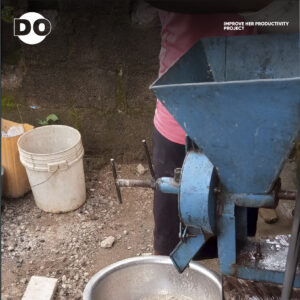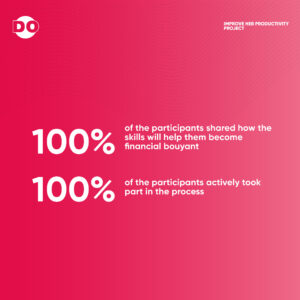Ujobundu Churchill trained 3 young ladies on how to make Kunu Zaki (Millet Drink) and bake doughnut from scratch
According to the World Bank, women represent approximately 70% of the agricultural labor force in Africa, playing a pivotal role in the continent’s food production and livelihoods. However, they often face limited access to resources and income disparities, making it challenging to improve their economic well-being.
This is where the significance of learning how to make drinks and snacks comes into play. By acquiring these skills, women can diversify their income streams, thereby alleviating financial challenges and contributing to poverty reduction. It’s a pathway to financial empowerment and economic independence, which is fundamental for women in the African context.
But the impact goes beyond economics. The United Nations Food and Agriculture Organization underscores the significance of nutrition in Africa, a continent where nearly 40% of children under five years old suffer from stunted growth due to malnutrition. Empowering women to create nutritious and culturally relevant snacks addresses this pressing issue. These snacks can enhance dietary diversity and, in doing so, contribute to improving the nutritional status of communities across the continent.
It’s a convergence of economic empowerment and improved nutrition, two pillars that are critical for holistic development. These skills not only hold the potential to transform the lives of individual women but also impact their families and communities positively.
On August 26, 2023, Ujobundu Churchill, a Grassroot Development Champion, executed the “Improve Her Productivity” Project in the Mpape area of FCT. She provided training to three young ladies, equipping them with the knowledge and skills to make kunu zaki (millet drink) and bake doughnuts from scratch. Ujobundu’s training was meticulous, starting with listing the necessary ingredients and providing substitutes, ensuring adaptability and resourcefulness.
The outcome was a resounding success. The three participants not only grasped the knowledge but also recognized the value of these skills in their personal lives. They saw how implementing the project could ease their financial challenges, bringing a tangible transformation in their livelihoods.
Ujobundu Churchill’s work exemplifies the power of grassroots initiatives in addressing broader social and economic challenges. It underscores the importance of empowering women through skill acquisition, thereby bridging the gender gap in economic opportunities and improving food security. By investing in African women, we don’t just transform individual lives; we uplift entire communities and catalyze progress across the continent.



